Reflective Essay: Leadership, Engagement, and NHS Performance Analysis
VerifiedAdded on 2024/05/16
|5
|1547
|79
Essay
AI Summary
This essay presents a student's reflective analysis on leadership and engagement within the National Health Service (NHS). The reflection covers the importance of staff engagement, its impact on patient outcomes, and the role of leadership in fostering a positive work environment. The author discusses the NHS's internal operations, leadership styles, and the need for improved leadership approaches to meet current challenges. The essay also details the research process, including literature review, data collection, and presentation preparation, highlighting the lessons learned and skills developed throughout the project. The reflection emphasizes the importance of collaborative efforts, continuous improvement, and effective communication in achieving organizational success within the healthcare sector. The student also reflects on the practical and theoretical understanding of NHS leadership and its implications for future career development. Desklib provides access to this and similar assignments for students.
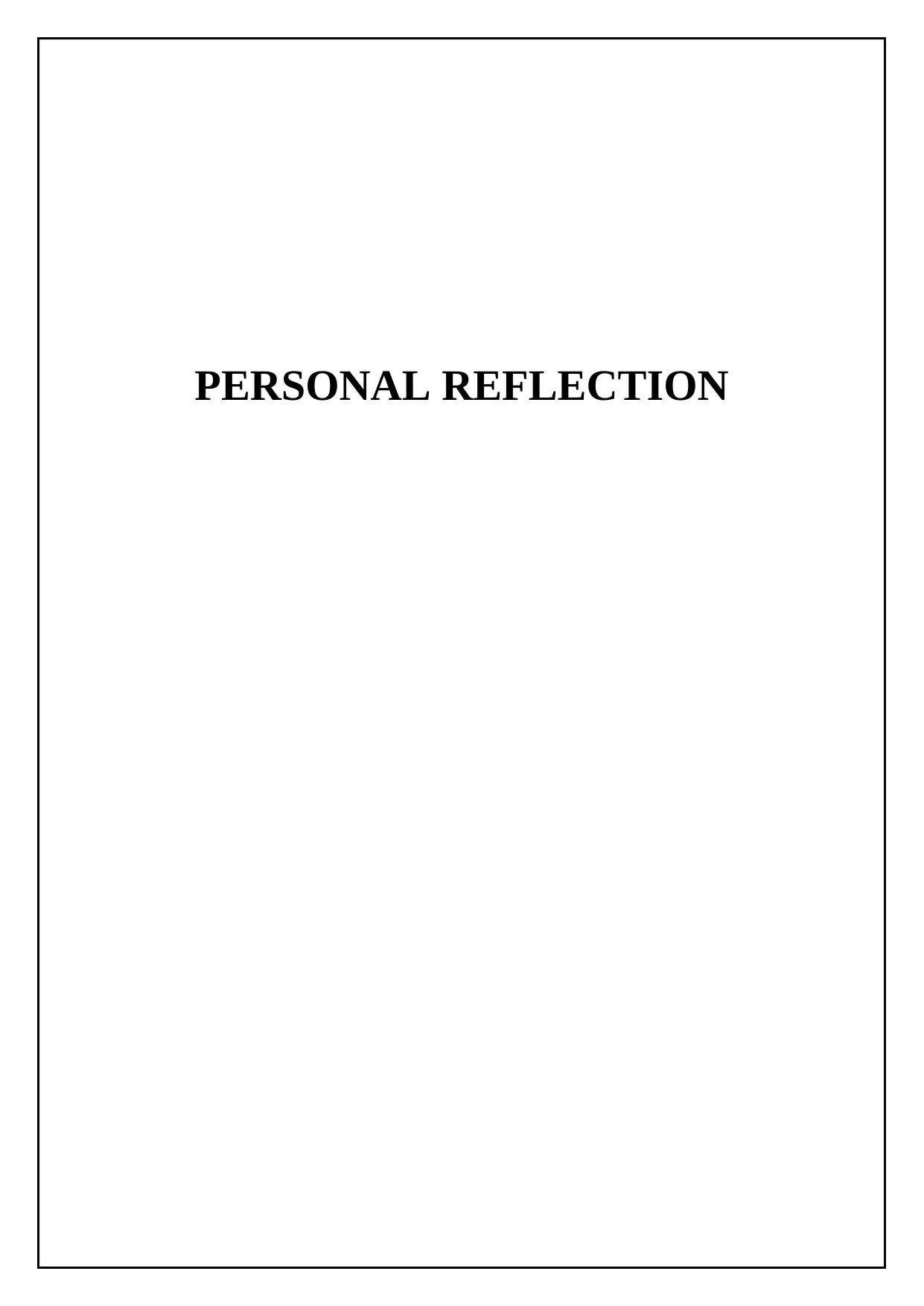
PERSONAL REFLECTION
Paraphrase This Document
Need a fresh take? Get an instant paraphrase of this document with our AI Paraphraser
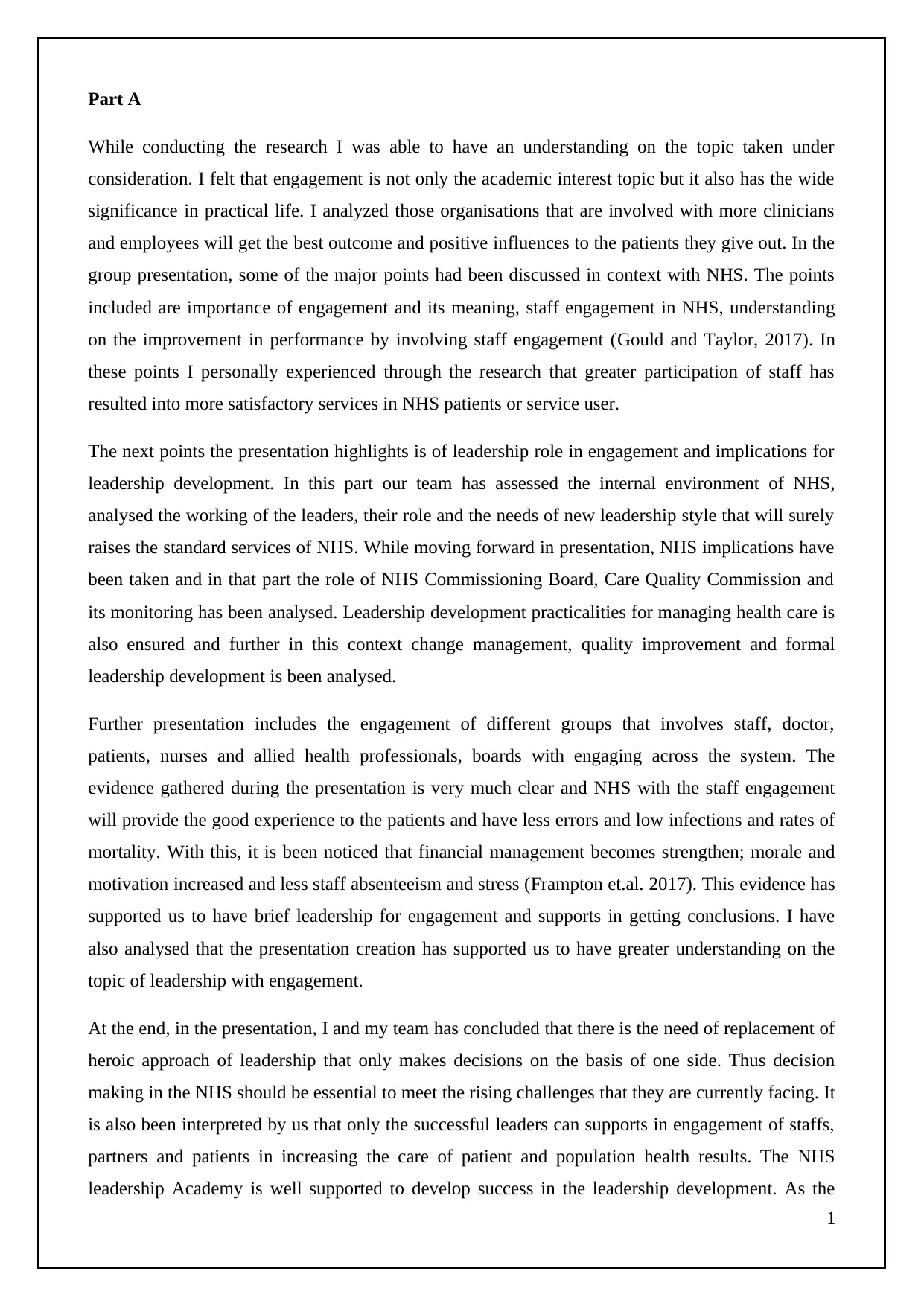
Part A
While conducting the research I was able to have an understanding on the topic taken under
consideration. I felt that engagement is not only the academic interest topic but it also has the wide
significance in practical life. I analyzed those organisations that are involved with more clinicians
and employees will get the best outcome and positive influences to the patients they give out. In the
group presentation, some of the major points had been discussed in context with NHS. The points
included are importance of engagement and its meaning, staff engagement in NHS, understanding
on the improvement in performance by involving staff engagement (Gould and Taylor, 2017). In
these points I personally experienced through the research that greater participation of staff has
resulted into more satisfactory services in NHS patients or service user.
The next points the presentation highlights is of leadership role in engagement and implications for
leadership development. In this part our team has assessed the internal environment of NHS,
analysed the working of the leaders, their role and the needs of new leadership style that will surely
raises the standard services of NHS. While moving forward in presentation, NHS implications have
been taken and in that part the role of NHS Commissioning Board, Care Quality Commission and
its monitoring has been analysed. Leadership development practicalities for managing health care is
also ensured and further in this context change management, quality improvement and formal
leadership development is been analysed.
Further presentation includes the engagement of different groups that involves staff, doctor,
patients, nurses and allied health professionals, boards with engaging across the system. The
evidence gathered during the presentation is very much clear and NHS with the staff engagement
will provide the good experience to the patients and have less errors and low infections and rates of
mortality. With this, it is been noticed that financial management becomes strengthen; morale and
motivation increased and less staff absenteeism and stress (Frampton et.al. 2017). This evidence has
supported us to have brief leadership for engagement and supports in getting conclusions. I have
also analysed that the presentation creation has supported us to have greater understanding on the
topic of leadership with engagement.
At the end, in the presentation, I and my team has concluded that there is the need of replacement of
heroic approach of leadership that only makes decisions on the basis of one side. Thus decision
making in the NHS should be essential to meet the rising challenges that they are currently facing. It
is also been interpreted by us that only the successful leaders can supports in engagement of staffs,
partners and patients in increasing the care of patient and population health results. The NHS
leadership Academy is well supported to develop success in the leadership development. As the
1
While conducting the research I was able to have an understanding on the topic taken under
consideration. I felt that engagement is not only the academic interest topic but it also has the wide
significance in practical life. I analyzed those organisations that are involved with more clinicians
and employees will get the best outcome and positive influences to the patients they give out. In the
group presentation, some of the major points had been discussed in context with NHS. The points
included are importance of engagement and its meaning, staff engagement in NHS, understanding
on the improvement in performance by involving staff engagement (Gould and Taylor, 2017). In
these points I personally experienced through the research that greater participation of staff has
resulted into more satisfactory services in NHS patients or service user.
The next points the presentation highlights is of leadership role in engagement and implications for
leadership development. In this part our team has assessed the internal environment of NHS,
analysed the working of the leaders, their role and the needs of new leadership style that will surely
raises the standard services of NHS. While moving forward in presentation, NHS implications have
been taken and in that part the role of NHS Commissioning Board, Care Quality Commission and
its monitoring has been analysed. Leadership development practicalities for managing health care is
also ensured and further in this context change management, quality improvement and formal
leadership development is been analysed.
Further presentation includes the engagement of different groups that involves staff, doctor,
patients, nurses and allied health professionals, boards with engaging across the system. The
evidence gathered during the presentation is very much clear and NHS with the staff engagement
will provide the good experience to the patients and have less errors and low infections and rates of
mortality. With this, it is been noticed that financial management becomes strengthen; morale and
motivation increased and less staff absenteeism and stress (Frampton et.al. 2017). This evidence has
supported us to have brief leadership for engagement and supports in getting conclusions. I have
also analysed that the presentation creation has supported us to have greater understanding on the
topic of leadership with engagement.
At the end, in the presentation, I and my team has concluded that there is the need of replacement of
heroic approach of leadership that only makes decisions on the basis of one side. Thus decision
making in the NHS should be essential to meet the rising challenges that they are currently facing. It
is also been interpreted by us that only the successful leaders can supports in engagement of staffs,
partners and patients in increasing the care of patient and population health results. The NHS
leadership Academy is well supported to develop success in the leadership development. As the
1
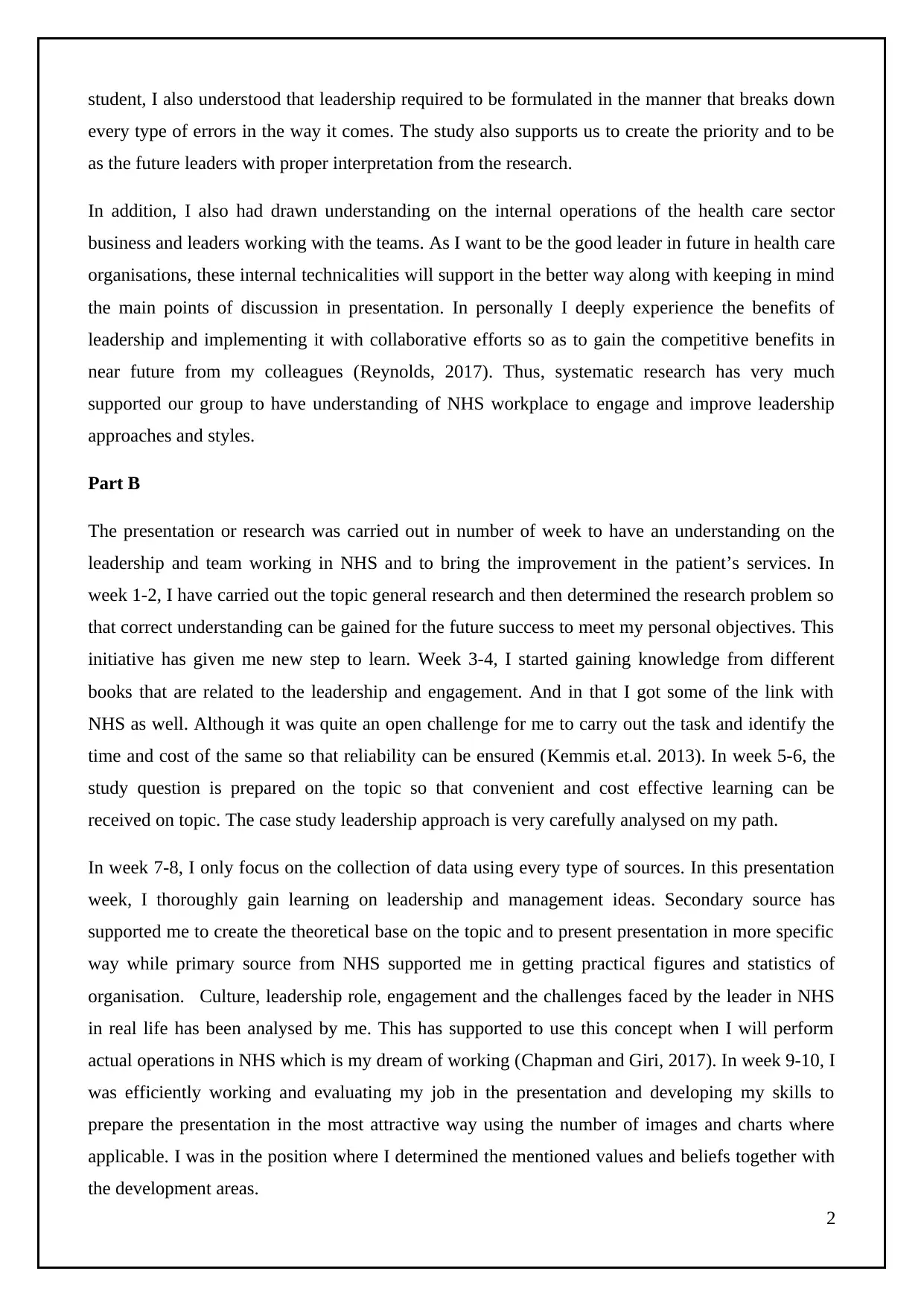
student, I also understood that leadership required to be formulated in the manner that breaks down
every type of errors in the way it comes. The study also supports us to create the priority and to be
as the future leaders with proper interpretation from the research.
In addition, I also had drawn understanding on the internal operations of the health care sector
business and leaders working with the teams. As I want to be the good leader in future in health care
organisations, these internal technicalities will support in the better way along with keeping in mind
the main points of discussion in presentation. In personally I deeply experience the benefits of
leadership and implementing it with collaborative efforts so as to gain the competitive benefits in
near future from my colleagues (Reynolds, 2017). Thus, systematic research has very much
supported our group to have understanding of NHS workplace to engage and improve leadership
approaches and styles.
Part B
The presentation or research was carried out in number of week to have an understanding on the
leadership and team working in NHS and to bring the improvement in the patient’s services. In
week 1-2, I have carried out the topic general research and then determined the research problem so
that correct understanding can be gained for the future success to meet my personal objectives. This
initiative has given me new step to learn. Week 3-4, I started gaining knowledge from different
books that are related to the leadership and engagement. And in that I got some of the link with
NHS as well. Although it was quite an open challenge for me to carry out the task and identify the
time and cost of the same so that reliability can be ensured (Kemmis et.al. 2013). In week 5-6, the
study question is prepared on the topic so that convenient and cost effective learning can be
received on topic. The case study leadership approach is very carefully analysed on my path.
In week 7-8, I only focus on the collection of data using every type of sources. In this presentation
week, I thoroughly gain learning on leadership and management ideas. Secondary source has
supported me to create the theoretical base on the topic and to present presentation in more specific
way while primary source from NHS supported me in getting practical figures and statistics of
organisation. Culture, leadership role, engagement and the challenges faced by the leader in NHS
in real life has been analysed by me. This has supported to use this concept when I will perform
actual operations in NHS which is my dream of working (Chapman and Giri, 2017). In week 9-10, I
was efficiently working and evaluating my job in the presentation and developing my skills to
prepare the presentation in the most attractive way using the number of images and charts where
applicable. I was in the position where I determined the mentioned values and beliefs together with
the development areas.
2
every type of errors in the way it comes. The study also supports us to create the priority and to be
as the future leaders with proper interpretation from the research.
In addition, I also had drawn understanding on the internal operations of the health care sector
business and leaders working with the teams. As I want to be the good leader in future in health care
organisations, these internal technicalities will support in the better way along with keeping in mind
the main points of discussion in presentation. In personally I deeply experience the benefits of
leadership and implementing it with collaborative efforts so as to gain the competitive benefits in
near future from my colleagues (Reynolds, 2017). Thus, systematic research has very much
supported our group to have understanding of NHS workplace to engage and improve leadership
approaches and styles.
Part B
The presentation or research was carried out in number of week to have an understanding on the
leadership and team working in NHS and to bring the improvement in the patient’s services. In
week 1-2, I have carried out the topic general research and then determined the research problem so
that correct understanding can be gained for the future success to meet my personal objectives. This
initiative has given me new step to learn. Week 3-4, I started gaining knowledge from different
books that are related to the leadership and engagement. And in that I got some of the link with
NHS as well. Although it was quite an open challenge for me to carry out the task and identify the
time and cost of the same so that reliability can be ensured (Kemmis et.al. 2013). In week 5-6, the
study question is prepared on the topic so that convenient and cost effective learning can be
received on topic. The case study leadership approach is very carefully analysed on my path.
In week 7-8, I only focus on the collection of data using every type of sources. In this presentation
week, I thoroughly gain learning on leadership and management ideas. Secondary source has
supported me to create the theoretical base on the topic and to present presentation in more specific
way while primary source from NHS supported me in getting practical figures and statistics of
organisation. Culture, leadership role, engagement and the challenges faced by the leader in NHS
in real life has been analysed by me. This has supported to use this concept when I will perform
actual operations in NHS which is my dream of working (Chapman and Giri, 2017). In week 9-10, I
was efficiently working and evaluating my job in the presentation and developing my skills to
prepare the presentation in the most attractive way using the number of images and charts where
applicable. I was in the position where I determined the mentioned values and beliefs together with
the development areas.
2
⊘ This is a preview!⊘
Do you want full access?
Subscribe today to unlock all pages.

Trusted by 1+ million students worldwide
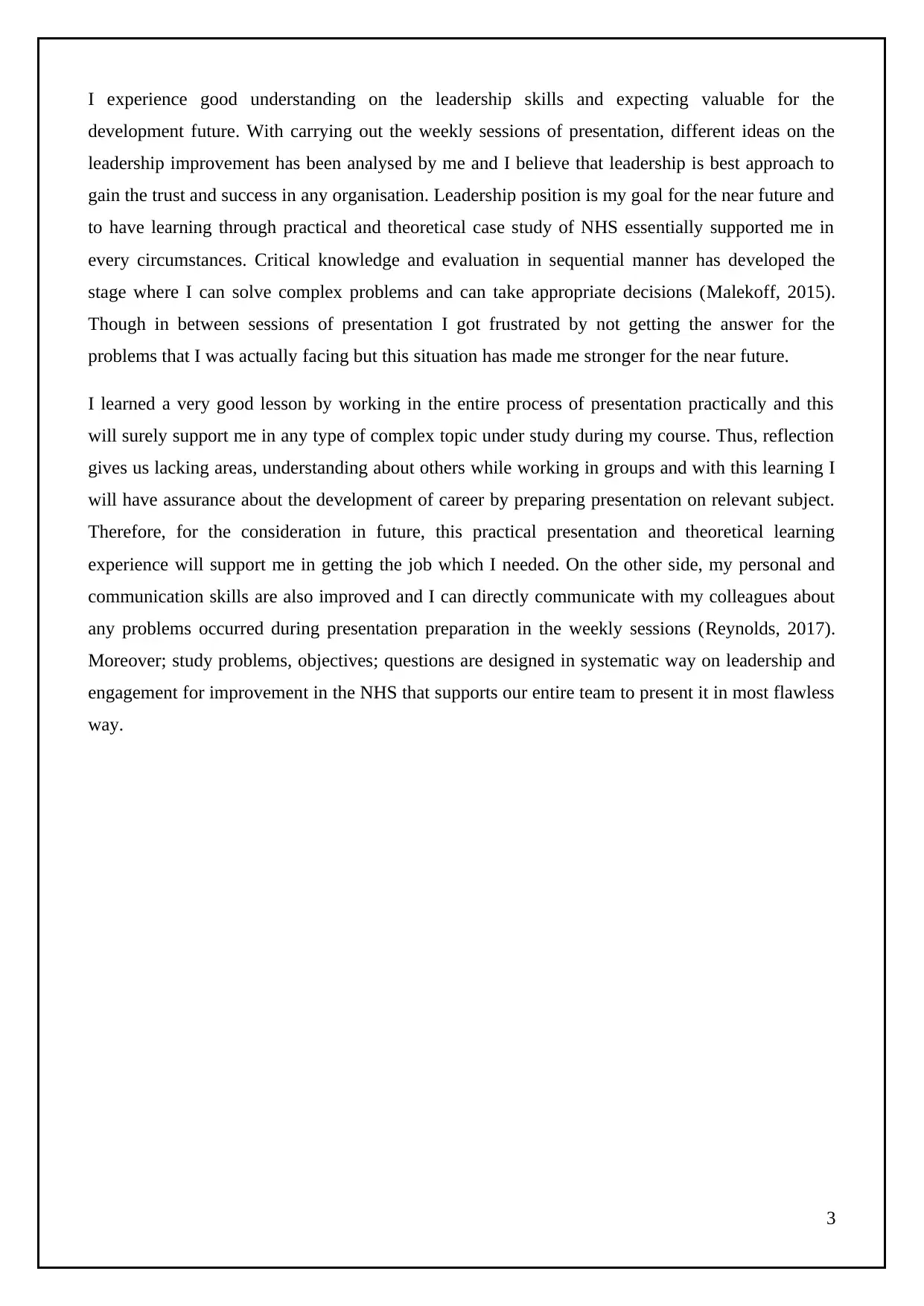
I experience good understanding on the leadership skills and expecting valuable for the
development future. With carrying out the weekly sessions of presentation, different ideas on the
leadership improvement has been analysed by me and I believe that leadership is best approach to
gain the trust and success in any organisation. Leadership position is my goal for the near future and
to have learning through practical and theoretical case study of NHS essentially supported me in
every circumstances. Critical knowledge and evaluation in sequential manner has developed the
stage where I can solve complex problems and can take appropriate decisions (Malekoff, 2015).
Though in between sessions of presentation I got frustrated by not getting the answer for the
problems that I was actually facing but this situation has made me stronger for the near future.
I learned a very good lesson by working in the entire process of presentation practically and this
will surely support me in any type of complex topic under study during my course. Thus, reflection
gives us lacking areas, understanding about others while working in groups and with this learning I
will have assurance about the development of career by preparing presentation on relevant subject.
Therefore, for the consideration in future, this practical presentation and theoretical learning
experience will support me in getting the job which I needed. On the other side, my personal and
communication skills are also improved and I can directly communicate with my colleagues about
any problems occurred during presentation preparation in the weekly sessions (Reynolds, 2017).
Moreover; study problems, objectives; questions are designed in systematic way on leadership and
engagement for improvement in the NHS that supports our entire team to present it in most flawless
way.
3
development future. With carrying out the weekly sessions of presentation, different ideas on the
leadership improvement has been analysed by me and I believe that leadership is best approach to
gain the trust and success in any organisation. Leadership position is my goal for the near future and
to have learning through practical and theoretical case study of NHS essentially supported me in
every circumstances. Critical knowledge and evaluation in sequential manner has developed the
stage where I can solve complex problems and can take appropriate decisions (Malekoff, 2015).
Though in between sessions of presentation I got frustrated by not getting the answer for the
problems that I was actually facing but this situation has made me stronger for the near future.
I learned a very good lesson by working in the entire process of presentation practically and this
will surely support me in any type of complex topic under study during my course. Thus, reflection
gives us lacking areas, understanding about others while working in groups and with this learning I
will have assurance about the development of career by preparing presentation on relevant subject.
Therefore, for the consideration in future, this practical presentation and theoretical learning
experience will support me in getting the job which I needed. On the other side, my personal and
communication skills are also improved and I can directly communicate with my colleagues about
any problems occurred during presentation preparation in the weekly sessions (Reynolds, 2017).
Moreover; study problems, objectives; questions are designed in systematic way on leadership and
engagement for improvement in the NHS that supports our entire team to present it in most flawless
way.
3
Paraphrase This Document
Need a fresh take? Get an instant paraphrase of this document with our AI Paraphraser
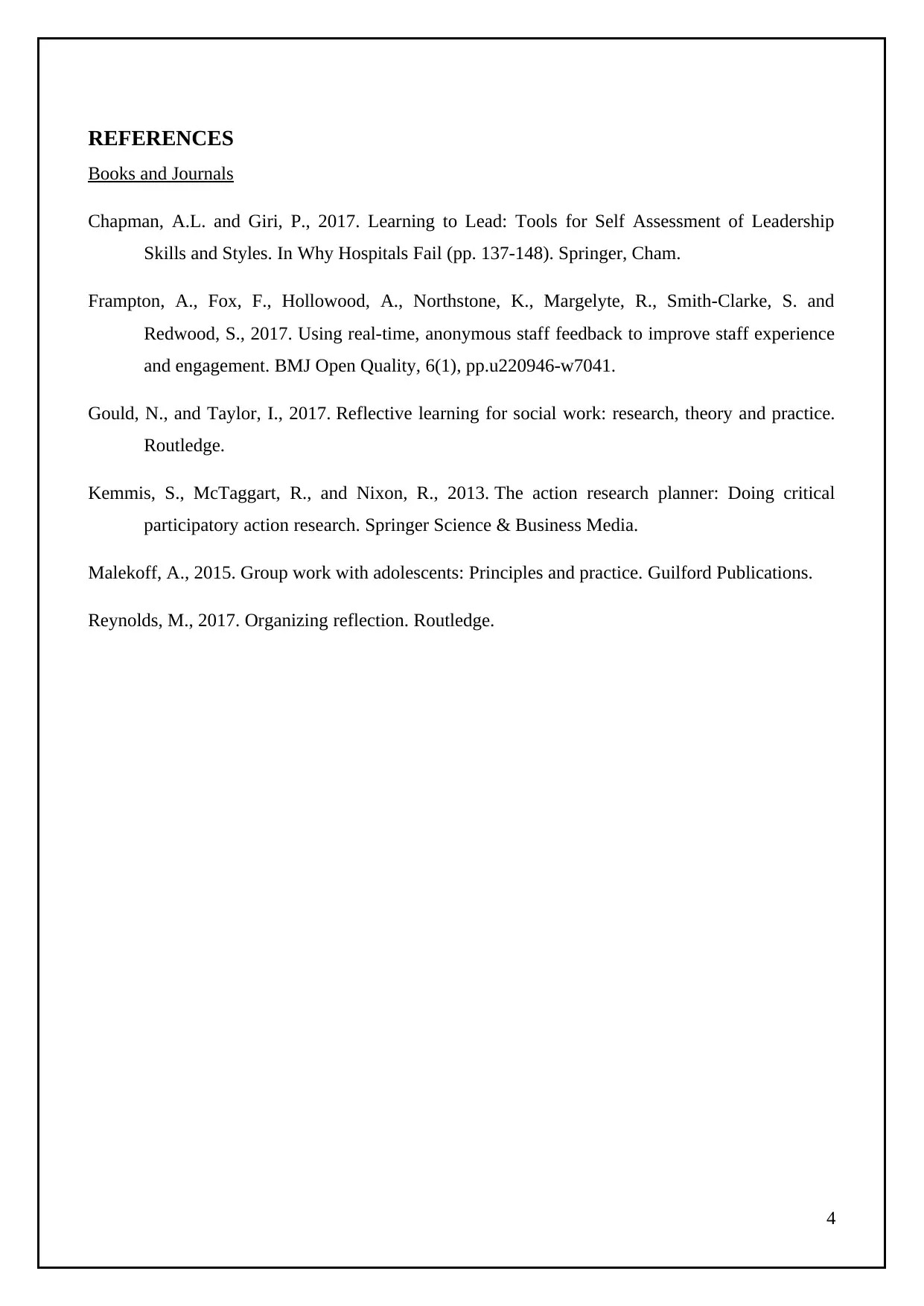
REFERENCES
Books and Journals
Chapman, A.L. and Giri, P., 2017. Learning to Lead: Tools for Self Assessment of Leadership
Skills and Styles. In Why Hospitals Fail (pp. 137-148). Springer, Cham.
Frampton, A., Fox, F., Hollowood, A., Northstone, K., Margelyte, R., Smith-Clarke, S. and
Redwood, S., 2017. Using real-time, anonymous staff feedback to improve staff experience
and engagement. BMJ Open Quality, 6(1), pp.u220946-w7041.
Gould, N., and Taylor, I., 2017. Reflective learning for social work: research, theory and practice.
Routledge.
Kemmis, S., McTaggart, R., and Nixon, R., 2013. The action research planner: Doing critical
participatory action research. Springer Science & Business Media.
Malekoff, A., 2015. Group work with adolescents: Principles and practice. Guilford Publications.
Reynolds, M., 2017. Organizing reflection. Routledge.
4
Books and Journals
Chapman, A.L. and Giri, P., 2017. Learning to Lead: Tools for Self Assessment of Leadership
Skills and Styles. In Why Hospitals Fail (pp. 137-148). Springer, Cham.
Frampton, A., Fox, F., Hollowood, A., Northstone, K., Margelyte, R., Smith-Clarke, S. and
Redwood, S., 2017. Using real-time, anonymous staff feedback to improve staff experience
and engagement. BMJ Open Quality, 6(1), pp.u220946-w7041.
Gould, N., and Taylor, I., 2017. Reflective learning for social work: research, theory and practice.
Routledge.
Kemmis, S., McTaggart, R., and Nixon, R., 2013. The action research planner: Doing critical
participatory action research. Springer Science & Business Media.
Malekoff, A., 2015. Group work with adolescents: Principles and practice. Guilford Publications.
Reynolds, M., 2017. Organizing reflection. Routledge.
4
1 out of 5
Related Documents
Your All-in-One AI-Powered Toolkit for Academic Success.
+13062052269
info@desklib.com
Available 24*7 on WhatsApp / Email
![[object Object]](/_next/static/media/star-bottom.7253800d.svg)
Unlock your academic potential
Copyright © 2020–2026 A2Z Services. All Rights Reserved. Developed and managed by ZUCOL.





